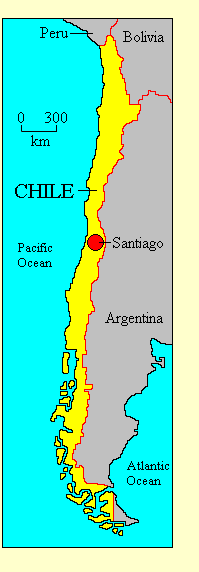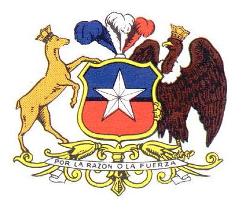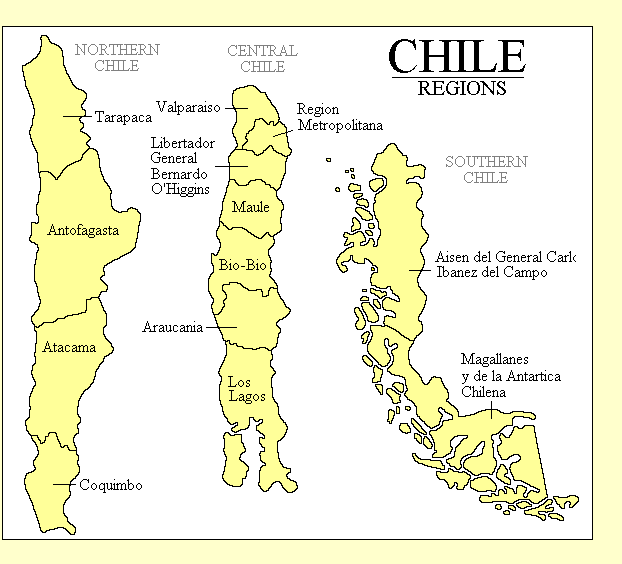

REPUBLIC OF CHILE
• Official name: Republica de Chile (Republic of Chile)
• Location: South America
• International organisations: The Asia-Pacific Economic Co-operation Forum, The Non-Aligned Movement, The
Organisation of American States, The Organisation for Economic Co-operation and Development, The United Nations,
The World Trade Organisation
• Borders: Argentina, Bolivia, Peru
• Coastline: South Pacific Ocean, Southern Ocean
• Land area: 756,950 Km2
• Population: 16,900,000
• Annual GDP (PPP) per capita: US$14,700 (2009 CIA estimate). World ranking: 60
• Ethnicity: The population is more than 95% of European (mainly Spanish) descent,
although many people have some Amerindian descent. About 3% are of entirely Amerindian
descent.
• Languages: Spanish is the official language and is universally spoken.
• Religion: Nearly the whole population is at least nominally Christian (Catholic
90%, Protestant 10%).
• Form of government: Presidential democratic republic. Chile is divided into 13 regions.
• Capital: Santiago de Chile
• Constitution: The current Constitution of Chile
came into effect on 11 September 1980. It was substantially revised in 2005. (The current version is not available online in
English.)
• Head of state: The President, elected by direct universal suffrage for a single four-year term.
• Head of government: The President, who appoints the members of the Cabinet.
• Legislature: Chile has a bicameral legislature, the
National Congress (Congreso Nacional).
The lower house is the Chamber of Deputies (Camara de Diputados), which has 117 members
elected for four-year terms from two-member constituencies. The upper house is the
Senate of the Republic (Senado de la Republica), which has 48 members. Of these, 38
are elected for eight-year terms from two-seat constituences, while up to 10 members
are appointed by the President.
• Electoral authority: The Interior Ministry and the
Electoral Service of Chile administer
national elections.
• Freedom House 2011 rating: Political Rights 1, Civil Liberties 1
• Transparency International Corruption Index: 72% (29 of 178 countries rated)
• Reporters Without Borders Press Freedom 2010 Index: 89.5% (33 of 178 countries rated)
• Heritage Foundation Economic Freedom 2010 Index: 77.4% (11 of 178 countries rated)

Political history
The coastal areas of what is now Chile were brought under Spanish rule in the mid 16th
century: Santiago de Chile was founded in 1541. In 1778 Chile became a captaincy-general
within the Spanish Empire. In 1818 the Spanish settlers declared the country independent,
and Bernardo O'Higgins, the local patriotic leader, became President. Following his resignation there
was a long period of disorder. But from 1833 an oligarchy of landowners established a
stable government which endured for a century.
Parliamentary government was introduced in 1891, but in 1925 a new constitution
restored the presidential system. But intense class conflict led to a period of
authoritarian rule from 1927 to 1932, followed by a restored constitutional regime
under a succession of conservative presidents.

The modern period of Chilean politics began with the election of a liberal,
Eduardo Frei, as president in 1964. Many reforms were carried out, and the hopes of the
poor were raised, but not satisfied. This led to the election, on a minority vote, of
the Socialist Salvador Allende in 1970. Allende's radical policies created a violent
reaction, culminating in an army coup in 1973 in which Allende was killed. The military
regime of Augusto Pinochet held office until 1990, when Pinochet retired and allowed a return to
civilian rule.
Chile's return to democracy has been surprisingly calm, with few demands for
retribution on either side. Pinochet's regime carried out a major liberalisation of the
economy which has given Chile unparalleled prosperity. In 2000 a moderate Socialist, Ricardo
Lagos, was peacefully elected President, marking an end to the divisions of the Allende-Pinochet
period.
The dominant force in Chilean politics since 1990 has been the centre-left coalition, the
Concertation of Parties for Democracy. This includes the centrist
Christian-Democratic Party of Chile, the social-democratic
Socialist Party of Chile, and the liberal
Party for Democracy. Also on the
left is the Communist Party of Chile, much
reduced in influence since the Allende era.
The conservative coalition, the Alliance for Chile, consists of the
Independent Democratic Union and the
National Renewal, both hard-line right-wing
parties. At the January 2010 presidential election, the Alliance candidate Sebastian Pinera
narrowly defeated the Concertation candidate, former President Eduardo Frei Ruiz-Tagle (son of the first President Frei).
This was the first time Chile has elected a right-wing president since 1958.
Updated November 2011
|


